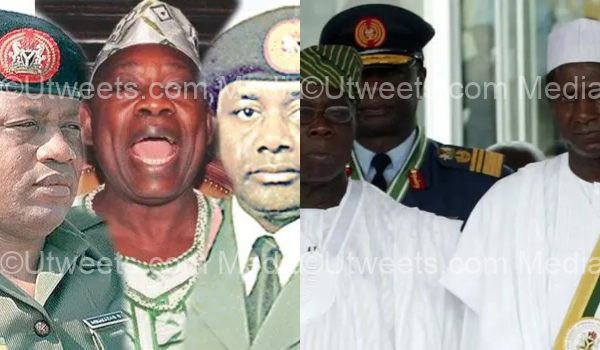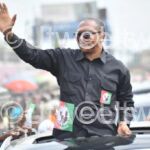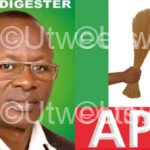The history of presidential elections in Nigeria is characterised by controversies over the credibility of the process but these five picks top the chat. Since Nigeria began its political journey to nationhood post-independence in 1960, no fewer than 10 presidential elections have been held with each of them resulting in one controversy or another mostly over the issue of credibility. ...Tap To Read The Full Story Here | ..Tap To Read The Full Story Here...
This trend of rancorous electoral outcomes can be said to have its roots firmly in the nation’s first real exposure to electoral contests in 1964. After achieving the status of a republic a year before, Parliamentary elections were held on December 30.
The process was marred by violence and manipulation, allegedly orchestrated by the Northern Peoples Congress (NPC) controlled by the federal government, which supervised the election.
The election’s aftermath saw a series of riots in the Western region and birthed the infamous Wild-Wild West situation, leading to the declaration of a state of emergency.
Historians and analysts have argued that the scenario of that period and the political atmosphere created a justification for the military officers who planned and executed the first military coup of January 1966 and its counter-coup of July 1966, which later plunged the nation into a civil war.
The military held sway for 13 years until General Olusegun Obasanjo fulfilled his commitment to restore democracy and conducted the first presidential election, ushering in Nigeria’s Second Republic in 1979.
This background provides the necessary historical context on the nature of electoral contests in Nigeria. Over the years, other presidential elections have turned out similarly or in some cases even more controversial.
Below are five of the most controversial presidential elections in the history of Nigeria;
The two-thirds controversy in 1979
The maiden presidential election in the country, held on August 11, 1979, produced a dramatic spectacle caused by a Constitutional provision.
The contest was between Chief Obafemi Awolowo of the Unity Party of Nigeria (UPN), Nnamdi Azikiwe of the Nigerian Peoples Party (NPP) and Shehu Shagari, whose National Party of Nigeria (NPN) had won the parliamentary elections a month before.
Shagari was declared the winner, having recorded 5,688,857 (33.77%) votes against his closest challenger, Awolowo who polled 4,916,551 (29.18) votes.
However, Awolowo challenged the outcome at the Supreme Court, contesting that Shagari had failed to fulfil the constitutional requirements to be declared winner.
Under the 1979 constitution, a candidate needed to receive the most votes nationwide and at least 25% of the vote in two-thirds of the states to be elected at the first ballot.
At the time of the election, Nigeria had 19 states, two-thirds of which, in exact figures, is 12.66. The practical improbability of this scenario created a conundrum that tainted the integrity of the election.
The dispute arose after Shagari had received the necessary threshold by winning 25% in 12 states and 20% in Kano State, which he claimed was two-thirds of the required 25% threshold and represented the remaining 0.66 in the constitutional threshold.
However, Awolowo argued that the threshold should be rounded up to thirteen states, which Shagari had not met. Still, the Supreme Court ruled in favour of the latter, who became Nigeria’s first elected president.
The annulled June 12 election
On June 12, 1993, the presidential election was held in Nigeria, the first since the 1983 military coup brought the country’s Second Republic to an abrupt end.
Regarded as the freest and fairest election in Nigeria’s history to date, the contest was a two-horse race between late Moshood Kashimawo Olawale (MKO) Abiola, who ran under the Social Democratic Party (SDP) and Bashir Tofa of the National Republican Convention (NRC).
The election was finally held after several postponements that stretched over four years by the Ibrahim Babangida-led military government, which had come under intense public pressure to leave the scene for the installation of civilian rule.
Two days before the poll, an organisation with ties to the military, Association for a Better Nigeria (ABN), led by Chief Arthur Nzeribe, secured a high court injunction against the election over alleged corruption. The move set the tone for the dramatic turn of events later.
The chairman of the National Electoral Commission (NEC), Humphrey Nwosu, dismissed the injunction on the argument that the high court lacks authority on election-related matters and proceeded to conduct the election.|GOD WILL JUDGE THEM: 18+ SEE. VIRAL VIDEO. HOW BOKO. HARAM. $L4UGHTERED. HUMAN .BEINGS LIKE. CHICKENS|.
The NEC began announcing the first batch of results on June 14, when Abiola won 19 out of 30 states and the Federal Capital Territory (FCT). Of the 6.6 million votes that had been announced, MKO had received 4.3 million and Tofa 2.3 million.
However, the process was thwarted after the ABN obtained another court injunction on June 15 to halt the counting and verification, which the NEC fully complied with the following day.
On June 24, 1993, Babangida made the infamous announcement, declaring the election annulment over claims that the process was fraught with vote buying and the need to protect the country’s judiciary.
What followed was a series of violent protests and political unrest, particularly in the South-West where it was estimated that security forces killed over 100 people while quelling the civil unrest.
With pressure mounting on Babangida to stick to the handover date, he threw in the towel on August 26, paving the way for an interim government led by Ernest Shonekan, whose interim government was toppled in a palace coup by General Sani Abacha.
Abiola’s continued fight for his mandate got him into trouble with the Abacha government which arrested and charged him for treason after declaring himself the president and commander-in-chief. The two gladiators died one month apart in 1998.
The sham called the 2007 election
There is no more abysmal election in Nigeria than that conducted by then-INEC chairman Prof Maurice Iwu in 2007, under Obasanjo.
The election was billed to be another milestone for Obasanjo, who was positioned to make history as the first democratically elected president to hand over to another, having taken over from the military in 1999 and installing civil rule 20 years before.
However, the process was widely described as a sham by local and international observers, including civil society organisations, journalists and missions. It was so bad even the beneficiary of the process, the late Umaru Yar’Adua, conceded that his emergence was questionable.
Yar’Adua was Obasanjo’s anointed candidate for the People’s Democratic Party (PDP), while the opposition All Nigeria Peoples Party (ANPP) featured Muhammadu Buhari, and incumbent Vice President, Atiku Abubakar, was the bannerman for the Action Congress (AC) after several failed attempts by INEC to prevent his participation.
Atiku, whose relationship with his principal had completely broken down after refusing to support his third-term agenda, was a recurring factor in the pre-election soap opera.
After a series of court cases to invalidate his disqualification from the exercise by INEC, Atiku was favoured by the Supreme Court, which confirmed his eligibility, prompting a last-minute change by INEC to add him to the list.
However, this created a logistical mess for the electoral umpire because 60 million presidential election ballot papers, which had been kept in South Africa to prevent tampering, didn’t arrive in Nigeria until the eve of the election with the reprinted papers not serially numbered as was intended.
Following the election, observer groups reported that the process fell far short of basic international standards and couldn’t be deemed credible due to poor election organisation, lack of transparency, significant evidence of fraud, voter disenfranchisement, violence and bias.
One group of observers noted that at one polling station in Yenagoa, Bayelsa’s capital, more than 2,000 votes were counted even though only 500 people were registered to vote. A similar case was reported in Rivers where election results were announced while voting was still ongoing at some polling units.
Even though official figures on voter turnout were not released, the turnout was estimated at 57.5% of 61.5 million registered voters. The results as announced by Iwu did not state the total votes scored in the states or the percentages of the scores by the presidential candidates.
In conclusion, the observers described the exercise as “the worst they had ever seen anywhere in the world,” with “rampant vote rigging, violence, theft of ballot boxes and intimidation.”
Embarrassed by these fallouts, Yar’Adua, after assuming office, acknowledged the flaws in the process that produced him and set up a committee led by Justice Uwais to recommend measures that would restore integrity to the electoral process.
BVAS, IReV, and FCT controversies in 2023
With technological innovations such as the Bimodal Voter Verification System (BVAS) and the INEC Results Viewing (IReV) portal incorporated into the electoral process to ensure results credibility and integrity, the 2023 presidential election still turned out controversial.|GOD WILL JUDGE THEM: 18+ SEE. VIRAL VIDEO. HOW BOKO. HARAM. $L4UGHTERED. HUMAN .BEINGS LIKE. CHICKENS|.
INEC promised in the build-up to the election that the technological tools would be a game changer, but the commission failed to maximise them on the election day, giving rise to allegations of compromise in favour of Bola Tinubu, candidate of the ruling All Progressives Congress (APC).
While the BVAS was near perfect during the voting phase, the technology largely failed to upload results to IReV from the polling units, forcing electoral officials to adopt the old manual collation process.
Though INEC blamed the development on network issues and attempts to hack the platform, it was widely speculated that the move was a plot to perpetuate manipulation as witnessed in the mutilation and alteration of some result sheets later uploaded on IReV.
The first and second runners-up, Atiku of the PDP and Peter Obi of the Labour Party protested the outcome of the process in court, accusing the umpire of reneging on its pre-election assurances.
At the same time, Obi challenged Tinubu’s declaration, arguing that the former Lagos State Governor had failed to meet all the constitutional requirements to be declared.|GOD WILL JUDGE THEM: 18+ SEE. VIRAL VIDEO. HOW BOKO. HARAM. $L4UGHTERED. HUMAN .BEINGS LIKE. CHICKENS|.
The Constitution prescribes a modified two-round system with up to three rounds for a president to emerge. To be elected in the first round, a candidate must score the majority of votes nationally and over 25% of the vote in at least 24 states and the Federal Capital Territory (FCT).
Obi said that Tinubu shouldn’t have been declared winner having failed to achieve the 25% threshold in Abuja, arguing that the requirement is mandatory. However, his arguments were squashed at the Supreme Court.
On his part, Atiku also asked the court to disqualify Tinubu on the ground that he was allegedly convicted of drug trafficking offences in the United States in 1993, adding extra drama to the scenario..…Read -T.he.Full_Article.Here.



